And now for 4/5ths of a completely different perspective (sorry, but choosing Cape Feare seems to be unanimous amongst all Simpsons fans) on the all-time best episodes of TV’s longest-running scripted show. Needless to say, this was no easy task, and dozens of runners-up deserve just as much recognition as those which I’ve singled out below, but if I could only get one disc of episodes recorded to take me with on a desert island (that has a DVD player), these would be the Simpsons tales I couldn’t leave behind:
Treehouse of Horror III (season 4, episode 5) (October 29, 1992)
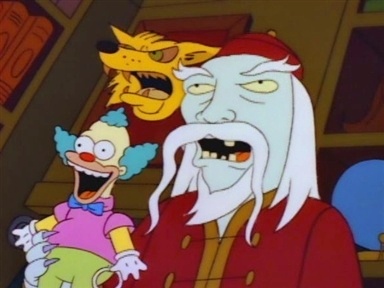
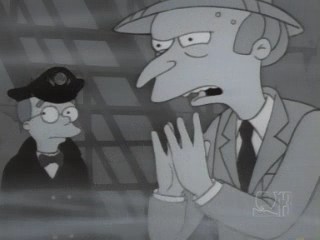
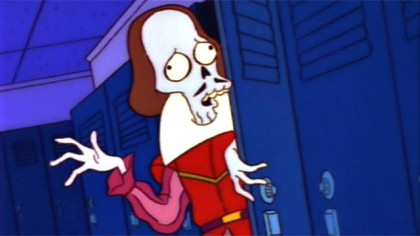 Even more so than Sideshow Bob and the later-developed trope of contriving visits to different foreign cities, the annual Halloween special is the show’s official recurring episode type throughout its 25 year span. Though it has long since left behind the horror-holiday angle to include just about any supernatural topics (fantasy, movie parody, anything that untethers Springfield from reality), its first several chapters were reverent odes to the spirit of spookiness, aiming not only to de-construct those scary dens of pop culture and inject Simpsons-brand DNA into their mythos but also to pull a Young Frankenstein on them by levying every frightening beat with wacky, light-hearted whimsy (my very favorite aspect of all the “Horror” specials and one that is played up in every single moment of this particular entry is this subversion of terrifying images and traumatizing events into deadpan reality, like oh no Skinner’s been decaptitated, but his severed head just admonishes a bunch of kids not to kick him so hard). I’d say the early Part III is the series pinnacle to date (who knows, maybe this coming weekend’s new edition will become the new champion, though aside from an overdue homage to Tod Browning’s Freaks, the idea of a Dr. Seuss lampoon and a rip-off of the show’s own 1991 guy-with-two-heads segment from Treehouse of Horror II do not inspire trust). The three mini-stories aren’t any more conceptually innovative than the norm – a killer doll based on the old Telly Salavas episode of The Twilight Zone, a King Kong riff, and one about summoning zombies (loosely taken from the Return of the Living Dead series) – but as per all the best Simpsons episodes, it’s both the peerless quality and compressed concentration of jokes that immortalizes this one. In the Clown Without Pity part alone, we have the sinister shopkeeper talking about frogurt, one of the show’s all-time greatest exchanges (“the Frogurt contains potassium benzoate!” “….” “That’s bad.”), Homer’s additional grievance that the toaster’s been laughing at him, a kind of cruel dig at Whoopi Goldberg’s asexuality, and the sublimely mundane twist that the switch on the back of the doll was accidentally set to “evil” instead of “good”.
Even more so than Sideshow Bob and the later-developed trope of contriving visits to different foreign cities, the annual Halloween special is the show’s official recurring episode type throughout its 25 year span. Though it has long since left behind the horror-holiday angle to include just about any supernatural topics (fantasy, movie parody, anything that untethers Springfield from reality), its first several chapters were reverent odes to the spirit of spookiness, aiming not only to de-construct those scary dens of pop culture and inject Simpsons-brand DNA into their mythos but also to pull a Young Frankenstein on them by levying every frightening beat with wacky, light-hearted whimsy (my very favorite aspect of all the “Horror” specials and one that is played up in every single moment of this particular entry is this subversion of terrifying images and traumatizing events into deadpan reality, like oh no Skinner’s been decaptitated, but his severed head just admonishes a bunch of kids not to kick him so hard). I’d say the early Part III is the series pinnacle to date (who knows, maybe this coming weekend’s new edition will become the new champion, though aside from an overdue homage to Tod Browning’s Freaks, the idea of a Dr. Seuss lampoon and a rip-off of the show’s own 1991 guy-with-two-heads segment from Treehouse of Horror II do not inspire trust). The three mini-stories aren’t any more conceptually innovative than the norm – a killer doll based on the old Telly Salavas episode of The Twilight Zone, a King Kong riff, and one about summoning zombies (loosely taken from the Return of the Living Dead series) – but as per all the best Simpsons episodes, it’s both the peerless quality and compressed concentration of jokes that immortalizes this one. In the Clown Without Pity part alone, we have the sinister shopkeeper talking about frogurt, one of the show’s all-time greatest exchanges (“the Frogurt contains potassium benzoate!” “….” “That’s bad.”), Homer’s additional grievance that the toaster’s been laughing at him, a kind of cruel dig at Whoopi Goldberg’s asexuality, and the sublimely mundane twist that the switch on the back of the doll was accidentally set to “evil” instead of “good”.
King Homer ups the ante with its richly nuanced animation, having equal fun trading in King Kong references and playing off the time period of its 1933 source with all the shadowy, foggy allure of vintage black-and-white cinematography, absurdly antiquated references that could pass as real (“then we’ll close with the ethnic comedy of Dugan and Durschwitz!”), “timely” digs at Shirley Temple and Al Jolson, and even a couple sly visual nods to the original Kong‘s primitive camera trickery. It also sets up the Treehouse of Horror motif of ruthlessly killing off its Springfield residents – Lenny gets eaten in a very meta way (“hey Homer, cut it out. Come on, quit eating me!”) and Smithers is randomly swallowed too (another case where the characters react casually to something horrific: Burns blithely says “oh well” when this happens, happy not to have to pay out the raise he’d just offered).
Dial Z for Zombies plays just as well with broader horror atmospherics and gets to show off Homer in rare hero mode, swing-cocking a shotgun with catch phrases like “show’s over, Shakespeare!” (whose zombie corpse is roaming the Springfield library for no explicable reason) and blowing away his arch-nemesis Ned Flanders without even realizing he was a zombie (a joke that has been repeated many, many times down the line, but never as well). It ends on what may be the show’s ultimate meta zinger (another one that has lost its effectiveness after being recycled thousands of times in later episodes and other TV shows), that even after vanquishing the undead, the Simpsons (and by proxy we the audience) are still zombified television viewers. Huge laughs, roller coaster pacing, terrific one-liners, insightful homages to horror classics, unforgiving satire, and the same heart-shaped iris closing out each segment as though it were a romantic happy ending – just another episode of The Simpsons‘ Golden Age.
Lisa’s Wedding (season 6, episode 19) (March 19, 1995)
While there’s a lot to admire about this show, I’ve never been a staunch advocate of its tender side. The best attempts at heartfelt moments – Homer looking up at the stars after his mom abandons him again, the wallpapering of his office with Maggie pictures set to the creed “do it for her”, Dustin Hoffman as Lisa’s substitute – are definitely for the record books, but for the most part I find it easier to admire The Simpsons for its dizzying comic brilliance and just ignore its already infrequent and sweet yet disposable touches of drama. That’s just not what I personally need The Simpsons for. Be that as it may, one special case of touching pathos I cannot deny is the finale to this episode, in which Lisa takes a stand in defense of her embarrassing yet well-meaning father. As the person often more tortured by Homer’s legacy of stupidity than anyone, it’s a lump-in-your-throat breakthrough when Lisa realizes Homer’s own wayward dignity has been compromised, and refuses to let anyone, even her star-crossed husband-to-be, put him down. Then when she finds him back at the fair with a newfound acceptance of his silly antics, that’s basically the theme of family love in a nutshell. For a show that essentially orbits Homer Simpson, what a revelation that instead of putting the protagonist through yet another learning experience, The Simpsons switches sides this time and humanizes him through the eyes of his least compatible opposite. Oh, and in the future, the robot caretakers can weep at the sight of blooming love, but then their heads catch on fire and melt. Lots of ridiculous twists on the flash-forward gimmick in this one. One of the very best that thankfully hasn’t come true yet: in the distant year 2010, trees are a thing of the past, represented by glitchy holographic projections.
You Only Move Twice (season 8, episode 2) (November 3, 1996)
I’m almost nervous about including this one, existing as it does on the cliff-side of the infamous and endlessly disputed Golden Age. Opinions vary but mine seems to coalesce with the largest majority of die-hard “Simpsons” fans: the 8th season was the last great one, and even it was already showing signs of expired wit. By the 9th season the humor took a sharp nose-dive. There were still fine episodes and in retrospect the quality shift isn’t nearly as noticeable at first, but I still remember back in 1997, a loyal disciple of the show being outright shocked at how bad so many of those 9th season episodes were. So it’s dangerous to select for my top 5 all-time favorites a half-hour in such close vicinity to the saddest, longest-lasting, most painful quality decline in TV comedy history. But just in case we’ve forgotten my motto: it’s all about the jokes. Nobody did it like The Simpsons during these years. Not as many successful funny bits jammed into a slender 22-minute runtime nor remotely as clever. If you look closely at the whole thing, You Only Move Twice nearly doesn’t work – its storyline progresses so quickly that for the first couple viewings you won’t notice how thin the whole premise is from start to finish, but that doesn’t matter at all when you’ve got Albert Brooks, the MVP of unpredictable Simpsons celebrity guest stars, as Hank Scorpio, Homer’s friendly new boss who happens to be a super-villain. With exchanges about the Hammock District on 3rd, the surrealistically stupid sight gag of Hank convincing Homer he never gave him his coat, and the great contrast between Brooks’ cheerful mania and Homer’s bored acquiescence, the banter between both men was already mind-bendingly hilarious before the episode decides to experiment with one of those Rosencranz and Guildenstern are Dead-type “A-story being presented as a distant subplot” plot reversals that are always ripe for ingenuity, but that just takes it all to an even higher level. Instead of watching the James Bond movie going on in the background, we focus on Homer cluelessly trudging around work, even “tackling a loafer” (aka preventing a Bond stand-in from saving the day, unknowingly securing his execution seconds later) at one point as though it were just a minor anecdote in his daily routine, and a headline at the end about Hank seizing the entire east coast is basically ignored. Whatever improvisatory magic Brooks brings to the table each time he returns to the show, whether as Jacques the bowling instructor or Brad Goodman the self-help guru, it’s beyond the staff-writing level, in a rarified realm of comic alchemy. It’s great that they haven’t bled this lucky charm dry the way they did Sideshow Bob, but then, maybe inviting him to run loose in the recording booth a bit more often these days (his last visit was back in 2005) would give the writers a needed jolt.
Cape Fear (season 5, episode 2) (October 7, 1993)
Of all the Sideshow Bob episodes, I can’t state for sure that this is the best one; it is closely rivaled by the time he tried to ban television by attacking an airshow, his campaign for Republican mayor, and the first time he crossed paths with brother Cecil in season 8. However, say it with me now, there’s just so many unforgettable jokes packed into this one – on top of the solid gold ones already mentioned by my colleague Tristan in last week’s column, we also have McBain’s disastrous attempt at a talk show (to his booing audience: “maybe you ALL are homosexuals!”), realizing it’s illegal to put squirrels down your pants for gambling, Bob trying to pen his memoirs with his own blood, “Die Bart Die” is actually German for “The Bart The”, Bob responding to Marge’s demand that he stay away from Bart with “oh I’ll stay away all right. Stay away…forever! …no wait, that’s no good.”), the sound of howling wolves about to devour grandpa, and fake-out (Marge threatening Bart with scissors) after fake-out (Ned threatening him with hedge-trimming finger razors) after fake-out (Krabapple casting him as a murder victim in the school day) after double fake-out (Homer attacking him twice in his room) – on top of an already surprisingly faithful wrap-around take on Scorsese’s Cape Fear remake, that it might be the most purely entertaining of them all.
And then there’s the Rake Gag, so haunting a comic risk that it demands capitalization when referenced (see: 12 words ago). It’s just Sideshow Bob getting hit in the face with a rake about 9 times in a row, and it was originally used just to fill time for an especially short episode, but it’s a deceptively post-modern comment on pretty much all comedy ever: if we’re aware of how dumb the joke is but we keep repeating it on a loop, does that make it funny again, or for the first time, or in spite of itself, or a maddening illustration of how repetition is key to comedy, or a show of contempt for the art of slapstick humor, or is this a hall of mirrors into which eternity itself can be glimpsed? Yes.
Lemon of Troy (season 6, episode 24) (May 14, 1995)
Like any sitcom, especially one as long-lasting as this beast, a bulk of the episodes seek fresh inspiration using traditional shortcuts: taking its characters to new jobs and locales, trying on different relationships, ret-conning deeper backstories, introducing volatile new foils, and performing the occasional formal experiment (the Halloween anthologies, other mini-trilogies, clip-shows, 2-part mysteries, direct movie parodies), but sometimes it’s just perfect telling a simple, home-made story about somebody’s daily routine. While Lemon of Troy fosters generally thought-provoking themes about pride in and loyalty to one’s origins, and is the first episode to really characterize Springfield’s evil twin city Shelbyville, on the surface it’s plotted as nothing more than Bart and his friends trying to recover some lemons stolen by bullies, as trifling a storyline as you can possibly imagine. Yet that’s also key to its sunny charm – the whole thing feels like an idyllic Saturday morning adventure, with low stakes yet great enthusiasm. And, of course, classic jokes galore, some of the best being:
- “Let’s bring him back to life using technology!”
- “[old-fashioned town pride] has been going downhill ever since the lake caught fire.”
- Nelson hucking trout at cars
- the word “squozen”
- “numerous angel sightings” being one reason why Springfield is a cool place to live
- “I’ll kick your butt!…at Nintendo.”
- “Look at the weak baby! You’re stupid, you stupid weak baby.”
- Jebediah Springfield is the founder of the Simpsons’ hometown. The founder of Shelbyville? Shelbyville Manhattan.
- Bart casts his friends in a clichéd action-movie ensemble: “And Todd’s the quiet religious guy who ends up going crazy.”
- Shelbyville Daily newspaper: once a week, every week
- “And that kid with the backpack said ‘radical’. I say ‘radical’! That’s my thing that I say!”
- Marge is in touch with youth lingo: “You graffito-tagged this sidewalk!” and “Bart’s joined a violence gang!”
- Homer’s short attention span: “Marge, you can’t blame all of Bart’s problems on your one little speech. If anything turned him bad, it’s that time you let him wear a bathing suit instead of underwear. AND let’s not forget your little speech!”
- “Spring forth, burly protector, and save me!”
- Shelbyville citizens showing their town pride: “Maybe that’s why we beat [Springfield] at football nearly half the time!” (laughing arrogantly)
- Milhouse’s awesome disguise kit consists of a fake cheek scar and a Beatles wig
- Milhouse, upon meeting his doppleganger: “So this is what it feels like…when doves cry.”
- “This whole raid was as useless as that yellow, lemon-shaped rock over there. Wait a minute…there’s a lemon behind that rock!”
- Nobody does turns of phrases as memorably as this show: “A car-impound lot, the impenetrable fortress of suburbia!”
- more Shelbyville bragging style: basking in the victory of stealing Springfield’s lemons, one of the dads from Shelbyville gloats, “Now if you’ll excuse me, all this talk has made me hungry” and bites into a lemon, his face folding in on itself and tears filling his eyes as he tries to hold his smirking glare.
- “Faster son! He has a taste for meat now!”
- more inimitable use of language: “Come quick boy, there’s a doin’s-a-transpirin’!”
I could go on like this indefinitely.
It might not look fair that all of my choices (and frankly just about all of my top 50, if I were to compile such a thing) come from the same narrow time period of the early-mid ’90s. After all, the show went on for 20 years and counting after most of the aforementioned 5 classics aired, so why aren’t any of those later episodes chosen? If you’ve seen the first several seasons of The Simpsons, you’ll know exactly why. For the uninitiated or staunchly contrarian, honoring the show for its quarter-century duration isn’t the best occasion to debate its decline, or incline, or recline, or any kine. Let’s just agree that we’re lucky it ever existed at all. I might not watch new episodes of the show anymore (an epic DVD marathon catch-up session might be in my future, though), but there is a comfort to be found in the show’s ongoing production. As an easygoing, brightly animated cartoon comedy with a vast population of colorful kooks and a comedy style fond of irony, wordplay, and sarcasm, with or without the wickedly sharp wit on which it built its reputation, it’s the kind of entertainment that never goes out of style or dates itself, and which can always induce a smile or two, even in its weakest episodes. As such, we applaud its longevity, dub the show an official institution of the televisual arts, and hell, salute to another 25 years. If Dan Castellenata, Harry Shearer, Julie Kavner, and the gang can survive that long, and those tense contract negotiations never get out of hand, then we’ll be proud to see it through to the 1,000th episode. Maybe by then we’ll have a full top 10 to offer!


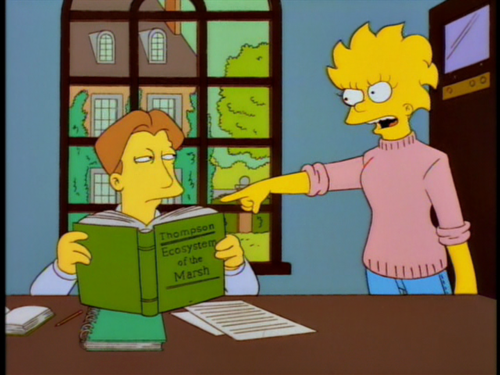
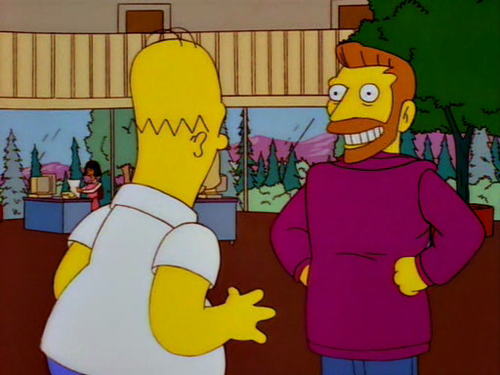

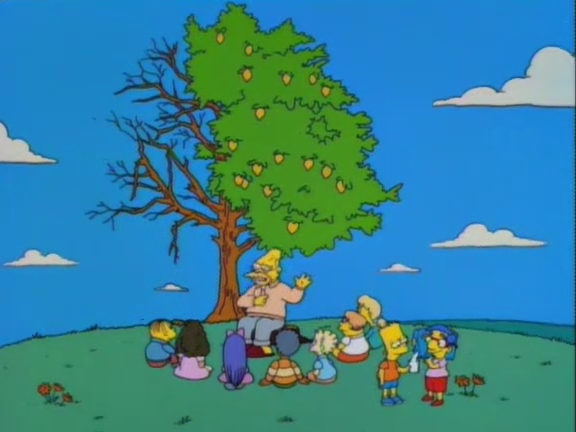
3 comments
KJ says:
Sep 30, 2013
I was late in turning mine in … here’s my little blurb on:
“Blame it on Lisa” – S13 E15
As we mentioned in Part I of our two-part series, The Simpsons don’t hesitate to poke subtle (or not-so subtle) fun at their fans, no matter what part of the world their fan base may be in. In Part I it was “Bart vs. Australia”, in Part II I’ll be talking about “Blame it on Lisa”, or better known as the episode where the Simpsons travel to Brazil and piss off the Brazilian government – IN REAL LIFE!
The laugh-a-second, “Cape Feare” will always be far and away my favorite episode of all-time. “Blame it on Lisa” runs a solid second because of my relation to the Brazilian culture. My wife was born and raised in Brazil. We were married in Brazil. My in-laws are all in Brazil. My family and I have visited Brazil five times in the last 10 years.
“Blame it on Lisa” debuted on March 2002. In April 2003, my wife was teaching English in a Brazilian school, and I had the privilege of hanging out there, hopping from class-to-class to help the students with their English, when “Blame it on Lisa” was brought up. Some of the students (and teachers) were highly offended by the Simpsons poking fun at their country and culture, as if they didn’t poke fun at us Americans on a weekly basis.
Bart learned Spanish, only to have Marge explain to him that Brazilians speak Portuguese. Do Americans think Brazilians speak Spanish? Yeah, most of us probably do. I can’t tell you how many times someone attempted to show off their Spanish-speaking skills to my wife, only to have her respond in English with, “I don’t speak Spanish.”
Do Americans really think Brazilians travel in congo lines? I hope not! But it’d be fun if they did!
Do Americans really think Brazilains LOVE soccer? Of course! Because they do! Just like in the episode, where the bellhops pass the luggage as if they are passing a soccer ball, I watched my sister-in-law juggle a ball with her feet and then boot it, all while wearing HIGH HEELS!
But still the Rio de Janeiro tourism bureau sued the Simpsons because they were afraid the episode would damage their image. They probably didn’t like when Lisa explained that the government painted the slums (and rats) bright colors so the tourists wouldn’t be distracted.
Yes, some of us Americans are ignorant and a bit confused (STILL!) that our winter is actually their summer. As Homer exclaims, “It’s opposite land! Crooks chase cops, cats have puppies, the hot snow falls up!”
But it’s a cartoon … and it’s funny … and it’s on our list!
http://www.youtube.com/watch?v=rljRyeClVEg
Tristan says:
Sep 30, 2013
So, big news as well I didn’t find until just now:
A character will apparently be killed off during the 25th season.
http://www.today.com/entertainment/simpsons-plots-kill-another-character-who-8C11293222
And I was just getting over Frank Grimes and Maude!
Kyle says:
Oct 1, 2013
I’m more fond of the sentimental moments of the show than you, but you did a great job here. I honestly would have a hard time ranking my top episodes, even if choosing them would be a lot easier.